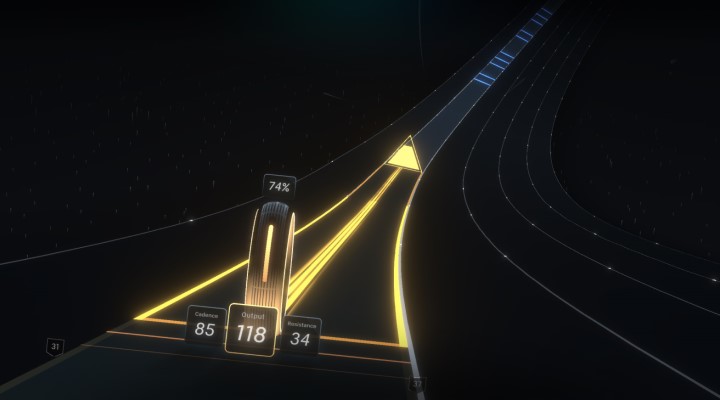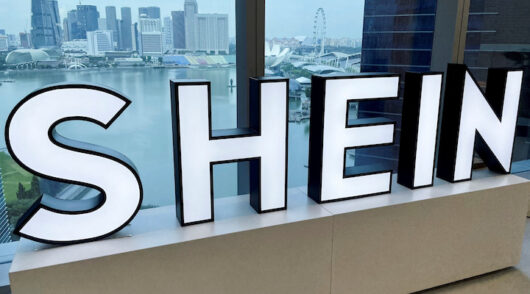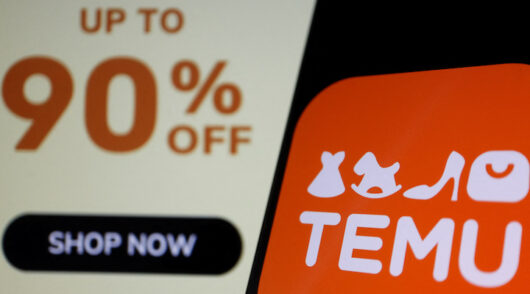Exercise platform Peloton launched its latest bike experience in February: Lanebreak, an interactive and competitive workout inspired by the booming video game industry.
Through a partnership with Warner Music Group, Peloton has created exercise regimes that scale between four different difficulty levels, sync up with a selection of well known songs, and aim to recreate the experience of video games like Guitar Hero and Rockband.
Using the Peloton stationary bike’s screen, riders will move through digital tracks and earn points based on doing the right thing at the right time: accelerate while on a yellow track, keep pace on a blue track, and switch between multiple lanes.
These points go toward an overall ‘high score’ which will be posted to the Peloton leaderboards, allowing users to compare and fight for the top spot.
According to Peloton’s senior director of product David Packles, this is the business’ first foray into gamified content, though it has been using the concepts of gamification for a long time.
“We’re still early in our journey,” Packles told Inside Retail.
“We are particularly excited about Lanebreak as it exposes an audience who may not be as comfortable or familiar with gaming-inspired experiences to how powerful it can be as a motivator, and we’re thrilled to bring this new fitness experience to Australians.”
According to Packles, Lanebreak is available through a software update to users’ existing Peloton Bike or Bike+, and offers its members a different take on its existing instructor-led content.
“It gives both new and existing members a chance to level up their training, whilst experimenting with this new gaming-inspired fitness content with dedicated music, for a fun and interactive cardio workout,” said Packles.
“Just like our instructors would challenge you to go hard and finish the last 30 seconds of a tough interval, Lanebreak offers a new way to achieve similar optimal results, and rewards you in real time for your actions.”
However, knowing that such a game-focused approach wouldn’t necessarily resonate with all of their users, Peloton chose to focus as much on the music as it did on the gamification, leading to the partnership with Warner Music Group.
The deal allows Peloton to create levels themed after certain artists, such as David Bowie and David Guetta.
The business has previously featured artists such as Outkast, Keith Urban, and Lizzo, and has worked with Beyonce on live and on-demand themed classes.
Similar to how an Instructor plans classes, each level is individually designed to match the energy of the music and the goal of the workout, and has been created with input from Peloton’s instructors.
“The intersection of fitness and gaming is an enormous opportunity that I think each industry has only touched the surface of thus far,” said Warner Music Group’s chief digital officer of business development Oana Ruxandra.
“Lanebreak combines Peloton’s already immersive content with the interactivity of games and the power of music to great effect.”
Beyond Australia, Lanebreak has also been launched in the United States, Canada, United Kingdom, and Germany.
Why focus on games?
Gamification has been used by many brands in the last decade in order to create a more engaging customer experience: utilising progress bars, achievements, and levels to signify that users have ‘achieved’ something through purchases or other interactions they may have with brands.
Some have even launched their own branded video games – such as Pepsi’s Pepsiman game released in the late 90’s, and KFC’s 2019 dating game ‘I Love you Colonel Sanders’ where you try to win the “heart of the brand’s mascot”.
Fitness apps also tend to utilise the tenets of gamification, such as the Nike+ app, tracking a user’s statistics and measuring them against their friends and family.
As such, Peloton’s deepening its foray into gamification makes a lot of sense.
“We’ve been including gamified elements like our leaderboard, our achievement badges, the real-time interactive metrics from device sensors [for years] – and you can see the influence of games in our features if you look closely,” said Packles.
For example: one of Peloton’s features, the ‘high five’, allows users to send one another a digital notification to cheer the other person on while they work out. This, according to Packles, was inspired by ‘quick comms’ in first person shooter games as a means of quickly sending and receiving information while in the middle of the action.






